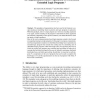Free Online Productivity Tools
i2Speak
i2Symbol
i2OCR
iTex2Img
iWeb2Print
iWeb2Shot
i2Type
iPdf2Split
iPdf2Merge
i2Bopomofo
i2Arabic
i2Style
i2Image
i2PDF
iLatex2Rtf
Sci2ools
139
click to vote
CLIMA
2006
2006
An Argumentation-Based Negotiation for Distributed Extended Logic Programs
Abstract. The paradigm of argumentation has been used in the literature to assign meaning to knowledge bases in general, and logic programs in particular. With this paradigm, rules of a logic program are viewed as encoding arguments of an agent, and the meaning of the program is determined by those arguments that somehow (depending on the specific semantics) can defend themselves from the attacks of other arguments. Most of the work on argumentation-based logic programs semantics has focused on assigning meaning to single programs. In this paper we propose an argumentation-based negotiation semantics for distributed knowledge bases represented as extended logic programs that extends the existing ones by considering sets of (distributed) logic programs, rather than single ones. For specifying the ways in which the various logic programs may combine their knowledge we make use of concepts that had been developed in the areas of defeasible reasoning, distributed knowledge bases, and multi...
Related Content
| Added | 30 Oct 2010 |
| Updated | 30 Oct 2010 |
| Type | Conference |
| Year | 2006 |
| Where | CLIMA |
| Authors | Iara Carnevale de Almeida, José Júlio Alferes |
Comments (0)

